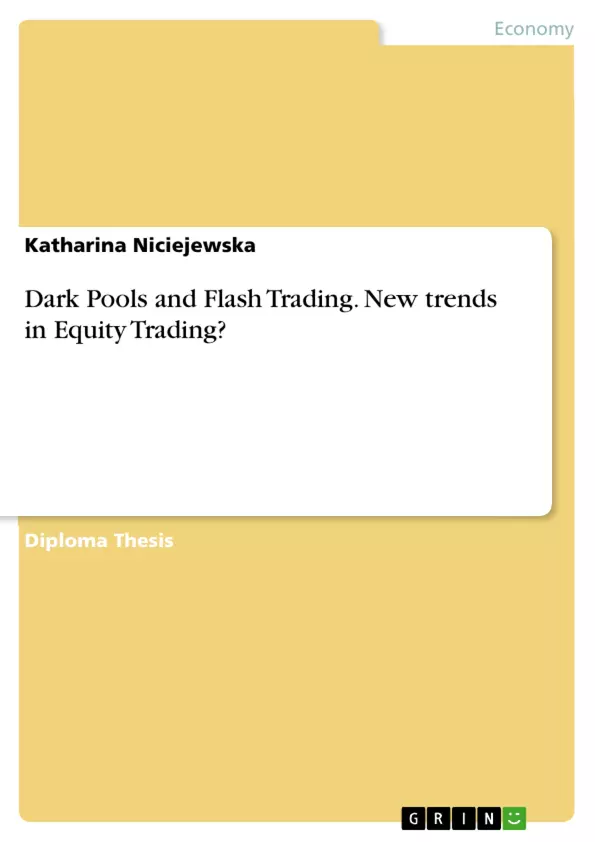
Dark Pools and Flash Trading. New trends in Equity Trading?
Diplomarbeit, 2012
85 Seiten, Note: 3,0
Leseprobe
Inhaltsverzeichnis (Table of Contents)
- Introduction
- Equity Trading and its new phenomenons – Definitions and Characteristics
- What is Equity Trading?
- Dark Pools - Definition
- Dark Pools - Rationale
- The Trading Framework
- Pre-trade phase
- Trade phase
- Post-trade phase
- Orders
- Market Orders
- Limit Orders
- Peg Orders
- Hybrid and Complex Orders
- Order Parameters
- Display Parameters
- Quantity Parameters
- Time in force Parameters
- Different types of Market Structures and Market Liquidity
- Physical and electronic markets
- Continuous Markets
- Quote-driven and order-driven markets
- Displayed and nondisplayed markets
- Market Liquidity
- Block liquidity
- Supply and demand for liquidity
- Pricing in the dark pool sector
- Price discovery
- Price derivation
- Regulatory Framework and Control in Europe
- Regulatory Framework in Europe - MiFID
- Financial Regulation and Dark Pools
- Reporting and transparency
- The structure of dark pools
- Exchange orders and brokers as sources of dark liquidity
- Multilateral Trading Facilities (MTFs) as sources of dark liquidity
- Electronic limit order books
- Crossing Networks/Price Reference Systems
- Broker desks as sources of dark liquidity
- Direct market access (DMA) as source of dark liquidity
- Hybrid business models as sources of dark liquidity
- Market overview
- Dark sector evolution
- Trading in the dark
- Execution issues
- Trading Strategies
- Block Trading
- Program Trading
- Algorithms and Algorithmic Trading
- High Frequency Trading
- Gaming
- Aspects of Technology
- Order Management Systems and Execution Management Systems
- Routing Engines
- Matching and Pricing Engine
- The FIX Protocol
Zielsetzung und Themenschwerpunkte (Objectives and Key Themes)
This work aims to explore the multifaceted world of dark pools in equity trading. It analyzes the definitions, characteristics, and functionalities of these alternative trading venues while examining their impact on market structures and liquidity. The text delves into the regulatory framework governing dark pools in Europe, particularly focusing on MiFID, and dissects the diverse structures and business models employed by these venues. Finally, it investigates trading strategies and technological aspects associated with dark pools, including high-frequency trading and algorithmic trading.
- Understanding the emergence and functioning of dark pools in equity trading
- Analyzing the influence of dark pools on market structures and liquidity
- Examining the regulatory landscape and transparency concerns surrounding dark pools in Europe
- Exploring diverse structures and business models employed by dark pools
- Investigating trading strategies and technological advancements in the context of dark pools
Zusammenfassung der Kapitel (Chapter Summaries)
The introductory chapter sets the stage for the discussion on dark pools, providing a general overview of equity trading and its evolving dynamics. Chapter 2 delves deeper into the concept of dark pools, defining their characteristics, rationale, and operational framework. It also examines various types of trading orders used in dark pools. Chapter 3 explores different market structures and their impact on market liquidity, emphasizing the role of dark pools in this context. Chapter 4 delves into the intricate issue of pricing within the dark pool sector, analyzing price discovery and derivation mechanisms. Chapter 5 focuses on the regulatory framework and control mechanisms governing dark pools in Europe, particularly examining the implications of MiFID. Chapter 6 provides a detailed analysis of the structures of dark pools, exploring various sources of dark liquidity and different business models. Chapter 7 examines trading practices in dark pools, analyzing execution issues, diverse trading strategies, and the technological infrastructure supporting them.
Schlüsselwörter (Keywords)
This work focuses on key topics such as dark pools, equity trading, market liquidity, market structures, regulatory frameworks, MiFID, trading strategies, high-frequency trading, algorithmic trading, and technological aspects of dark pools. The text explores the implications of these concepts for both market participants and regulators.
Details
- Titel
- Dark Pools and Flash Trading. New trends in Equity Trading?
- Hochschule
- Hochschule für Angewandte Wissenschaften Hamburg
- Veranstaltung
- International Finance
- Note
- 3,0
- Autor
- Katharina Niciejewska (Autor:in)
- Erscheinungsjahr
- 2012
- Seiten
- 85
- Katalognummer
- V285140
- ISBN (eBook)
- 9783656850786
- ISBN (Buch)
- 9783656850793
- Dateigröße
- 1039 KB
- Sprache
- Englisch
- Schlagworte
- Dark Pools
- Produktsicherheit
- GRIN Publishing GmbH
- Preis (Ebook)
- US$ 39,99
- Preis (Book)
- US$ 51,99
- Arbeit zitieren
- Katharina Niciejewska (Autor:in), 2012, Dark Pools and Flash Trading. New trends in Equity Trading?, München, Page::Imprint:: GRINVerlagOHG, https://www.diplomarbeiten24.de/document/285140
- Autor werden
- Ihre Optionen
- Vertriebskanäle
- Premium Services
- Autorenprofil
- Textarten und Formate
- Services für Verlage, Hochschulen, Unternehmen

- © GRIN Publishing GmbH.
- Alle Inhalte urheberrechtlich geschützt. Kopieren und verbreiten untersagt.
- info@grin.com
- AGB
- Open Publishing
Der GRIN Verlag hat sich seit 1998 auf die Veröffentlichung akademischer eBooks und Bücher spezialisiert. Der GRIN Verlag steht damit als erstes Unternehmen für User Generated Quality Content. Die Verlagsseiten GRIN.com, Hausarbeiten.de und Diplomarbeiten24 bieten für Hochschullehrer, Absolventen und Studenten die ideale Plattform, wissenschaftliche Texte wie Hausarbeiten, Referate, Bachelorarbeiten, Masterarbeiten, Diplomarbeiten, Dissertationen und wissenschaftliche Aufsätze einem breiten Publikum zu präsentieren.
Kostenfreie Veröffentlichung: Hausarbeit, Bachelorarbeit, Diplomarbeit, Dissertation, Masterarbeit, Interpretation oder Referat jetzt veröffentlichen!
- GRIN Verlag GmbH
-
- Nymphenburger Str. 86
- 80636
- Munich, Deutschland
- +49 89-550559-0
- +49 89-550559-10
- info@grin.com
-









